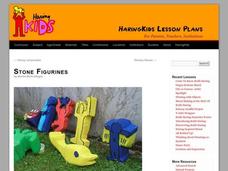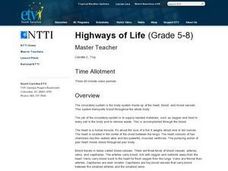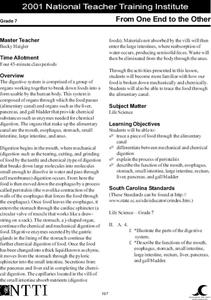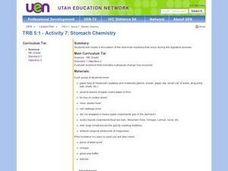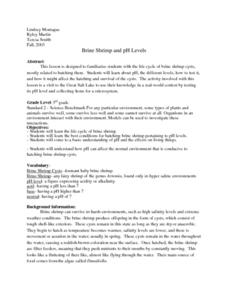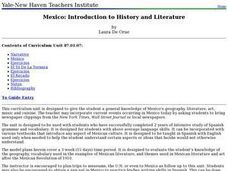Curated OER
Stone Figurines
Students analyze visual arts by examining images on the Internet. In this figurine lesson, students research Keith Haring's artwork on the web and identify his body movement artistic style. Students utilize soft stones, carving...
Curated OER
Waterdrops Watershed Issue
In this environment worksheet, middle schoolers take part in a variety of activities that includes an experiment, word search, and readings related to the watershed.
Curated OER
What Does The Heart Do?
Students study the relationship between the heart and circulation. In this circulatory system lesson plan, students read the "What Am I?" article about the heart and discuss. Students draw a heart and lungs, discover how blood is...
Curated OER
Highways of Life
Students explore the circulatory system. They participate in media activities to explore blood flow and identify the parts of the circulatory sytem. Students create a model of the circulatory system.
Curated OER
Regions of North America: The Chesapeake Bay
In this reading comprehension worksheet, students read an article on "The Chesapeake Bay". Students read 5 sentences and fill in each blank in each sentence with a word from the article. Students answer 3 short answer questions...
Curated OER
Watersheds and Wetlands
Students discuss the idea of a watershed. They build models of watersheds using paper and observe what happens to their models when it "rains". In addition, they build a second watershed to compare watersheds with wetlands to those without.
Curated OER
From One End to the Other
Seventh graders trace a piece of food through the digestive system. They describe the functions of the mouth, esophagus, stomach, etc.
Curated OER
The Human Organism
In this digestion and nutrition lesson, 3rd graders test foods to find their vitamin content. Students test for starch and fats then compare their findings on charts and oral reports. The lesson concludes with a teacher directed...
Curated OER
Physical vs. Chemical Changes
In this chemical reactions worksheet, students read about the differences between physical and chemical changes in substances. Then kids identify situations as either an example of physical or chemical change. Students learn how to...
Curated OER
MuscleMania
Middle schoolers learn three different types of muscles. By building a model of the arm, they learn its basic anatomy and how muscles function in relationship to bones. They perform an experiment on the relationship between muscle size...
Curated OER
Stomach Chemistry
Fifth graders compare physical and chemical changes. They perform a simulation experiment/activity that replicates what happens in the stomach as food is digested by stomach acids.
Curated OER
Feed Me, Seymour
Young scholars work in small groups to create posters illustrating the major facts and functions of plant organs. Within their groups, they assume the role of specialists creating specialized posters pertaining to the different parts of...
Curated OER
Kidney Filtering
Students investigate how kidneys function. They discuss how a dialysis machine works, and conduct an experiment in which they filter different substances through a plastic window screen, various sizes of hardware cloth, and poultry...
Curated OER
Early Filtrate Functioning
In this biology worksheet, high schoolers look at the function of filtering in the nephron of the kidneys and the biochemistry is emphasized.
Curated OER
Fayettewood Squares
If used as a center activity, this short presentation could be a motivating way for learners to review material relating to plants, the circulatory system, and more. However, there are only nine questions. It would be more useful if...
Curated OER
Oily Oceans
Pupils are read a book about oceans. They participate in an experiment discovering the effects of oil on water. They discuss different types of pollution and how they can be prevented.
PBS
Make a Balloon Globe
"We've got the whole world in our hands," is what your students will be singing after completing this fun geography activity. Using the included templates for the seven continents and a balloon, they create their very own globes.
Concord Consortium
Hydrogen Bonds: A Special Type of Attraction
How does hydrogen bonding explain ice crystals? An engaging interactive answers just that. Scholars explore how polar molecules interact and observe the changes as temperature fluctuates as well as the hydrogen bond attraction.
National Park Service
Climate Science in Focus: A Streamflow River Study
Data speaks, but it's our job to determine what it's trying to say. Young scientists explore the changes in weather and climate using data from the Yosemite National Park in a six-day unit. Learners first compare weather and climate and...
Curated OER
Outcomes Science 4
In this outcome science 4 worksheet, students apply scientific knowledge to answer and calculate a variety of questions. Students research the answer to several questions using the websites suggested.
Curated OER
Brine Shrimp And Ph Levels
Third graders investigate the different ph levels found in water that is tested using simple measurements. The water samples are taken from a local body of water. The ph levels are used to help indicate areas where shrimp can thrive in...
Curated OER
Lung Limit
Students explore one's lung capacity, the human body, displacing volume of water with volume of air and spirometer use. Using simple math, students figure out their lung capacity by breathing into a bottle filled with water and...
Curated OER
A Drink Is a Drink, but People Are Different
Students observe demonstrations that illustrate the amount of alcohol in various drinks and how it is distributed in the body. They discover the effects of alcohol on the brain due to its high water content. They calculate alcohol...
Curated OER
Mexico: Introduction to History and Literature
Students study the geography of Mexico (i.e. major cities, surrounding countries and bodies of water, mountain ranges, rivers, volcanoes), They take turns reading aloud information provided (xerox copies) about Mexico. After each...
Other popular searches
- Bodies of Water
- Landforms and Bodies of Water
- Major Bodies of Water
- Bodies of Water/rivers
- Bodies of Water Lesson
- Identifying Bodies of Water
- Different Bodies of Water
- Bodies of Water 101
- Bodies of Water Word Scramble
- Landforms and Water Bodies
- Earth's Bodies of Water
- Healthy Bodies Water


